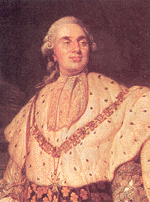
Louis XVI (1774-1792)

Louis XVI (1774-1792)
The traditional political, social, and economic system
of France before 1789 was called the Old Regime. Under the Old Regime,
the king was an absolute
monarch, the clergy and nobles enjoyed many privileges,
and the commoners burdened by heavy taxes were denied any political rights.
And, the people were divided into three rigid, istinct classes, called
Estates.
The First Estate
The First Estate consisted of the clergy who were considered a privileged class. The Catholic Church, with its vast income from untaxed lands and from the tithe, was determined to prevent any restrictions whatever on its privileges.
The Second Estate
The Second Estate consisted of the nobles who enjoyed
great wealth and
privileges. Nobles held the best and most profitable
positions in the army,
government, and church. In addition, they were exempt
from most taxes.
The Third Estate
The Third Estate, the unprivileged citizens, who paid
taxes in money,
produce, and labor, consisted of the bourgeoisie (middle
class), city workers,
and the peasantry. Although small in numbers, the bourgeoisie
was the
wealthiest, most educated, and mos outspoken group within
the Third
Estate. These lawyers, bankers, merchants, and businessmen
resented
the fact that they were being taxed without any sort
of representation, and
they were determined to remedy the situation. Peasants
made up the largest
group within the Third Estate. In general, French peasants
were better off
than peasants in other parts of Europe, but still they
complained about the
burden of heavy taxes, and the Corvee or forced labor
they had to perform.
Indeed, in the Old Regime, there were many deep-rooted
abuses.